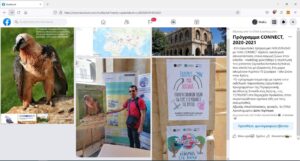News . Best Practices Rewilding Greece: Mapping the population of Gypaetus barbatus barbatus (Best Practice Greece)

This good practice reports an open schooling activity with a structured scenario, named “Rewilding”, developed by a pedagogical team of science teachers from RDE of Crete, during the pandemic period. The activity was carried out in the state school “1st Vocational High School of Arkalochori” in the municipality of Minoa Pediadas in the prefecture of Heraklion, Greece.
CARE: The authentic scientific issue that the students ‘worried about’ was the return of an endangered animal in our country, the Gypaetus barbatus barbatus. The science professional, Dr.Iasmi Stathi from the Natural History Museum of Crete, is a Biologist, who interacted with the students to answer and bring up questions, helping in the discussion with 15 young people.
KNOW: Students learned to work in a scientific way. They learned to cooperate and to find solutions to problems. They enjoyed learning in a different way. The amount of time was proper and the whole implementation was really interesting for students.
DO: Students created, with the help of the teacher:
- A map of the population of Gypaetus barbatus barbatus by country, created with the ArcGIS mapping program:
- https://tinyurl.com/55z3enrr
- A poster that was posted in the bulletin board of the school, in the Facebook page of the school and presented in the exhibition of the European School Projects of Crete, by the RDE of Crete:
- https://tinyurl.com/4df6jpd3
- https://tinyurl.com/6kcf9bxm
- https://tinyurl.com/u5b47ryu
- https://tinyurl.com/p8vs8sv
The framework that was implemented followed the “Care-Know-Do” methodology. Discussion supported by participatory science has led to greater awareness of endangered species and environment. This initiative had the consent of the parents and opened opportunities for dialogue with the family, students, teachers and scientists.
Findings about open schooling: There were no many limitations with the curriculum, as we managed to embody the practice in our lessons (Biology, food chains, food webs, ecosystems, environmental sciences etc.). The whole project carried out with support from the teacher. The main problem was the lack of time and the pressure to complete the material of curriculum. Furthermore, the limitations of the covid-19 pandemic. Science-action resources absolutely met teacher’s needs.
Results for students: Students learned to work in a scientific way. They learned to cooperate and to find solutions to problems. They enjoyed learning in a different way.